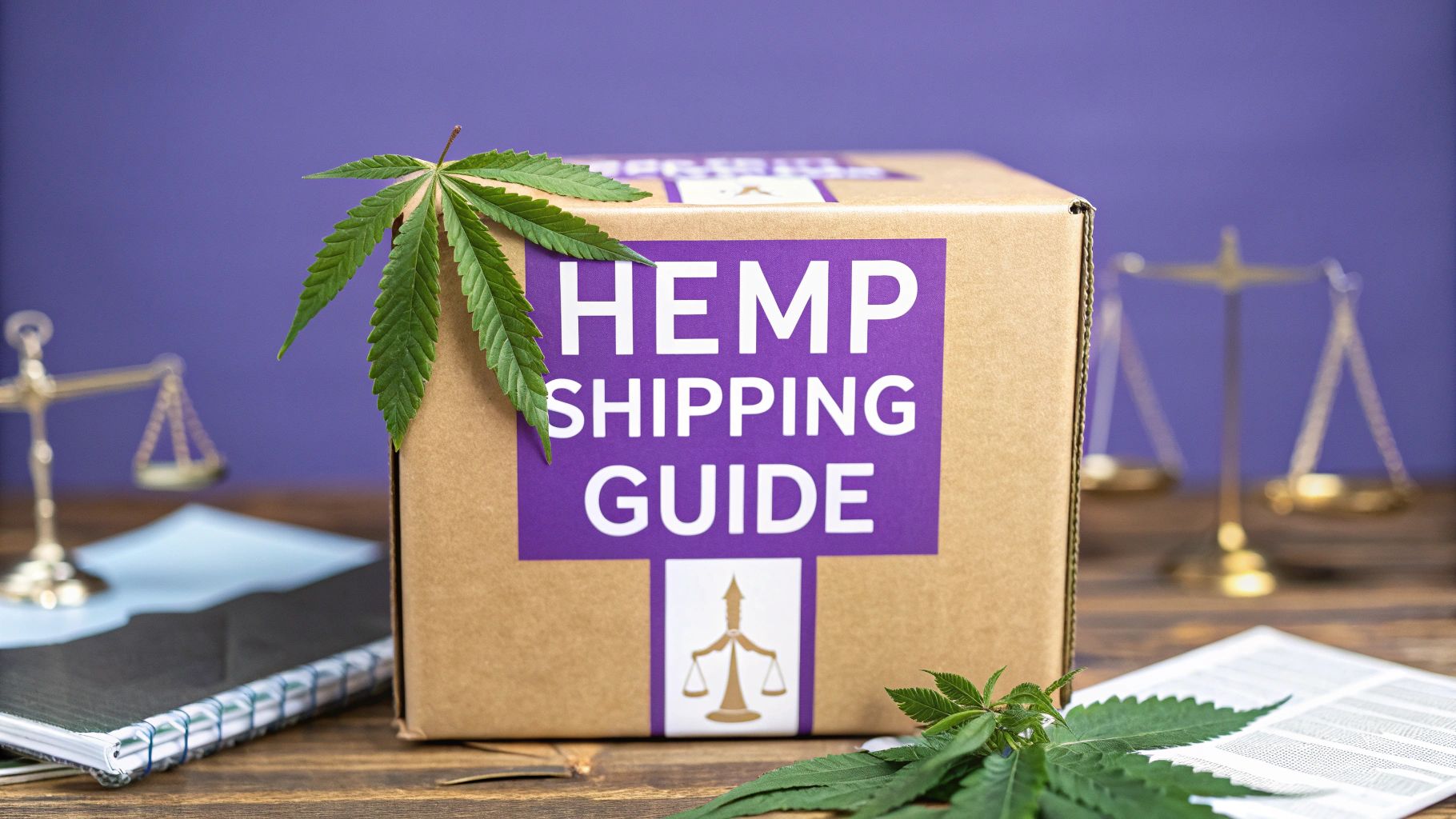
CBD/Hemp/THCA Shipping Laws Illinois: Complete Guide
Discover everything about CBD/Hemp/THCA Shipping Laws Illinois. Stay compliant and ship with confidence using our expert legal guide.
Cody Y.
Updated on Oct 14, 2025
Navigating the web of CBD, hemp, and THCA shipping laws in Illinois can feel like a headache, but the core issue boils down to a simple distinction. While federally compliant hemp and CBD products (those with less than 0.3% Delta-9 THC) are generally clear for shipping into the state, products containing THCA are stuck in a major legal gray area. This confusion trips up both businesses and their customers.
The Current State of Hemp Shipping in Illinois
The legal framework we operate in today was built on two key pieces of legislation. It all started with the 2018 Farm Bill, which federally legalized hemp by separating it from marijuana based on its Delta-9 THC content. This was a landmark move that swung the doors wide open for shipping compliant hemp products across state lines.
Following the federal government's lead, Illinois passed its own Industrial Hemp Act, bringing state law in line with these new federal standards. This made it crystal clear that your everyday CBD oils, topicals, and edibles could be legally shipped to and sold in Illinois, as long as they stayed under that critical 0.3% Delta-9 THC threshold.
But as this infographic shows, these foundational laws unintentionally carved out the regulatory loophole that now causes all the confusion.
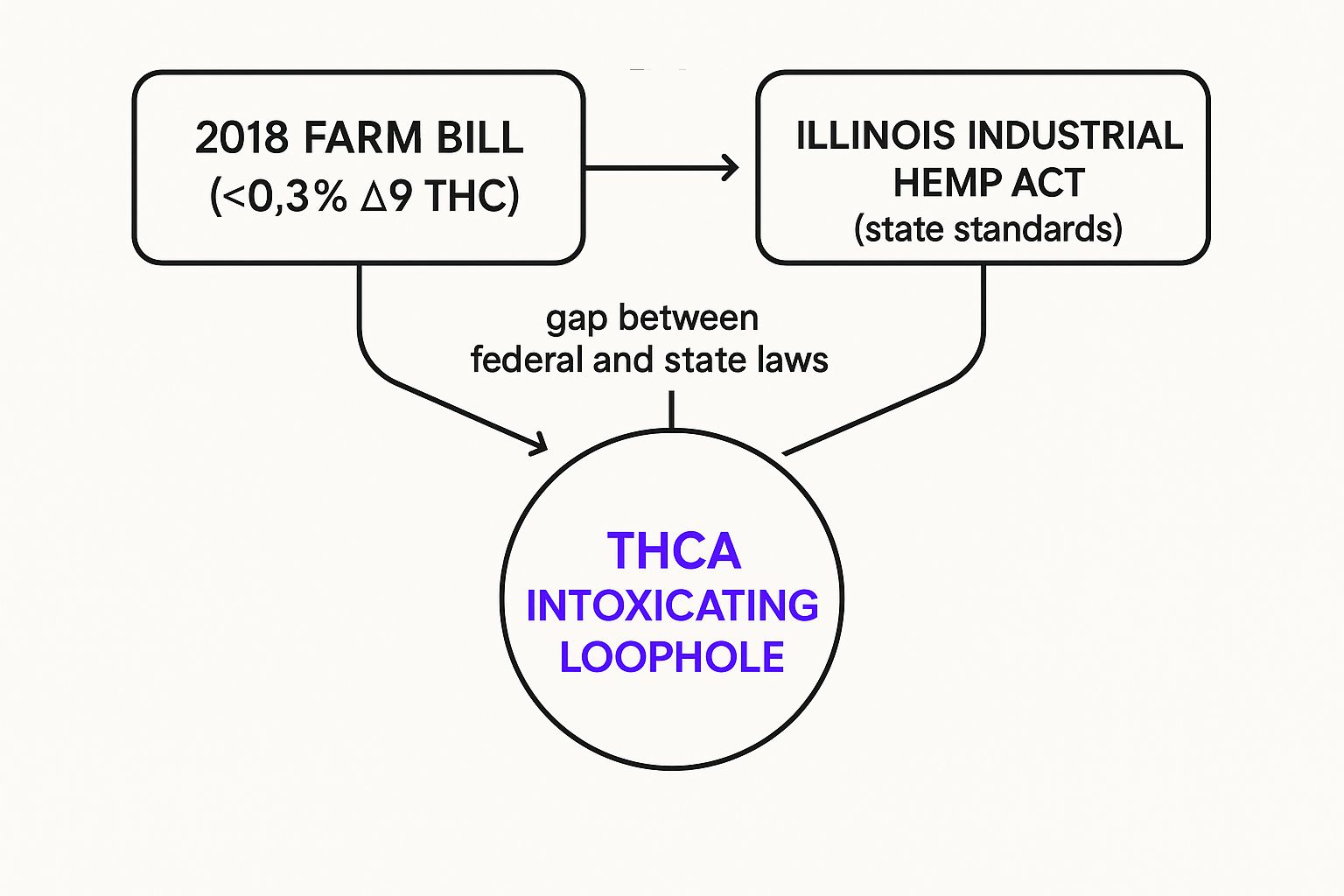
As you can see, the gap between the federal definition of "hemp" and Illinois's rules for in-state cannabis growers is exactly where the trouble with THCA begins.
To quickly summarize the shipping situation for various hemp products heading to Illinois, we've put together this table.
Illinois Hemp-Derived Product Shipping Status at a Glance
| Product Type | Federal Status (Post-Farm Bill) | Illinois Shipping Status | Key Considerations |
|---|---|---|---|
| CBD Oil/Tinctures | Legal (<0.3% Delta-9 THC) | Legal & Low-Risk | Must have valid Certificates of Analysis (COAs) confirming THC levels. |
| CBD Edibles | Legal (<0.3% Delta-9 THC) | Legal & Low-Risk | Subject to standard food safety regulations; THC content is paramount. |
| Hemp Topicals | Legal (<0.3% Delta-9 THC) | Legal & Low-Risk | Generally the safest product category to ship. |
| Smokable THCA Flower | Legal (<0.3% Delta-9 THC, pre-combustion) | Legal Gray Area | Protected by federal interstate commerce, but contentious within the state. High-risk. |
This table shows the clear divide: standard CBD products are good to go, but THCA flower occupies a much riskier legal space.
The THCA Loophole Explained
The whole conflict centers on THCA (tetrahydrocannabinolic acid). In its raw form, it's a non-intoxicating cannabinoid, but when you heat it up—by smoking or vaping—it converts into the psychoactive Delta-9 THC. Here’s the catch: since raw THCA flower often contains less than 0.3% Delta-9 THC, it technically qualifies as legal hemp under the 2018 Farm Bill. That technicality is the loophole.
However, Illinois throws a wrench in the works for its in-state growers by enforcing a ‘total THC’ rule, which accounts for the potential THC created after heating. This creates a bizarre paradox:
- In-State Cultivators: Are stuck with strict 'total THC' testing, which effectively bans them from growing high-THCA hemp.
- Out-of-State Shippers: Can send federally compliant (<0.3% Delta-9 THC) THCA products into Illinois, shielded by federal interstate commerce laws.
This regulatory gap means that while Illinois has broadly legalized hemp-derived CBD products, the landscape for intoxicating cannabinoids like THCA is far more complex and uncertain. For a deeper dive, check out our guide on state-specific hemp shipping rules and restrictions.
Navigating the Gray Area
This whole situation leaves many e-commerce businesses in a tough spot. Since the Illinois Industrial Hemp Act passed, shipping standard CBD products is a straightforward, low-risk activity. But thanks to federal interstate commerce protections, out-of-state THCA flower continues to pour into Illinois, fueling a market that exists completely outside the state’s regulated cannabis system.
For any online store, this means shipping standard CBD to Illinois is safe. Shipping THCA, on the other hand, means stepping into a legal gray area that lawmakers are actively trying to shut down. Understanding these distinct legal statuses is the first and most critical step toward compliant shipping.
Understanding Hemp, Marijuana, and THCA
To get a handle on Illinois's shipping laws, you first need to understand the products at the center of the debate. The legal line between hemp and marijuana isn't about how the plant looks or what species it is. It all comes down to a single, critical number set by federal law.
That one chemical threshold is the bedrock of the entire legal framework.
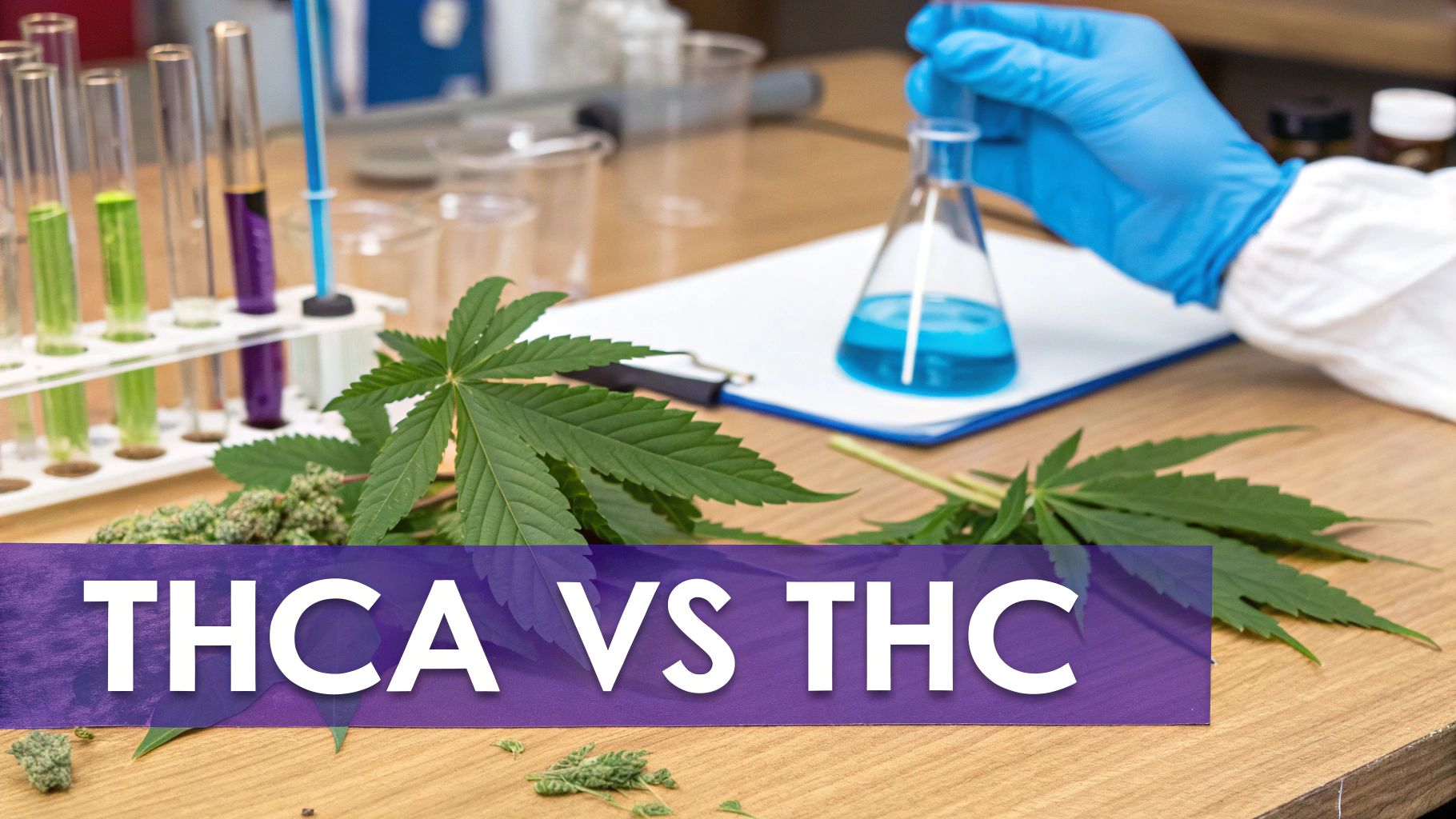
The 2018 Farm Bill drew a clear line in the sand. A cannabis plant is legally considered hemp if it contains 0.3% or less Delta-9 THC by dry weight. If it goes a hair over that line, it becomes marijuana—a federally controlled substance—no matter what its other properties are.
This 0.3% Delta-9 THC limit is like a legal passport. Products that stay under this number can travel freely in interstate commerce, which is exactly why compliant CBD products can be shipped to Illinois without any trouble.
The THCA Factor: Decarboxylation
Now, let's bring in the molecule causing all the confusion: THCA (tetrahydrocannabinolic acid). Think of THCA as the raw, inactive precursor to THC. It’s like cake batter—it has all the ingredients to become a cake, but it isn't one yet.
In its natural, raw state, THCA is completely non-intoxicating. It only converts into the psychoactive Delta-9 THC when it gets heated up through a process called decarboxylation. This happens instantly when someone smokes, vapes, or cooks with it.
This simple chemical reaction is the entire reason for the regulatory showdown. A raw THCA flower can be legally classified as hemp because its Delta-9 THC level is below 0.3%, yet it can produce a powerful intoxicating high when someone actually uses it.
The core of the legal loophole is this simple scientific fact: THCA is not THC until it is heated. Federally, the law only measures the pre-heated Delta-9 THC content, creating a path for intoxicating products to be sold as legal "hemp."
A Tale of Two Standards: Federal vs. Illinois
This brings us to the central conflict shaking up CBD, Hemp, and THCA shipping laws in Illinois. There are two competing standards at play, and they create the very loophole many online businesses are currently using.
- The Federal Standard (2018 Farm Bill): This defines hemp based only on its Delta-9 THC concentration, which must be below 0.3%. This is the standard that governs products shipped across state lines.
- The Illinois Standard (for cultivators): Illinois hits its own hemp farmers with a stricter "total THC" rule. This test measures not just the existing Delta-9 THC but also the potential THC that could be created from THCA after heating.
This dual-standard system creates a major disconnect. While an Illinois farmer can't legally grow high-THCA flower, an out-of-state company can ship that exact same product right into Illinois because it meets the federal definition of hemp. For a deeper dive, you can learn more about the critical shipping law differences between hemp and marijuana products in our detailed guide.
This legal gray area is what allows the online sale and shipment of THCA products to Illinois residents, even as state regulators and licensed cannabis businesses are pushing for much tighter controls. Understanding this distinction—between the federal "passport" and Illinois's stricter internal rule—is critical for any business shipping cannabinoid products into the state. It explains why some products are perfectly safe to ship while others are walking a regulatory tightrope.
How to Ship Hemp Products to Illinois Without Breaking the Law
Alright, let's move from theory to the real world. Knowing the laws around shipping CBD, hemp, and THCA to Illinois is one thing; actually getting your products there compliantly is another beast entirely. For any e-commerce business in this space, getting shipping right isn't just a good idea—it's the bedrock of your entire operation.
Think of it like trying to cross an international border. Your products need a passport and all the right paperwork, and you have to follow the rules of the road set by the shipping carriers. If you don't have your ducks in a row, your shipment could get turned away, or worse, seized.
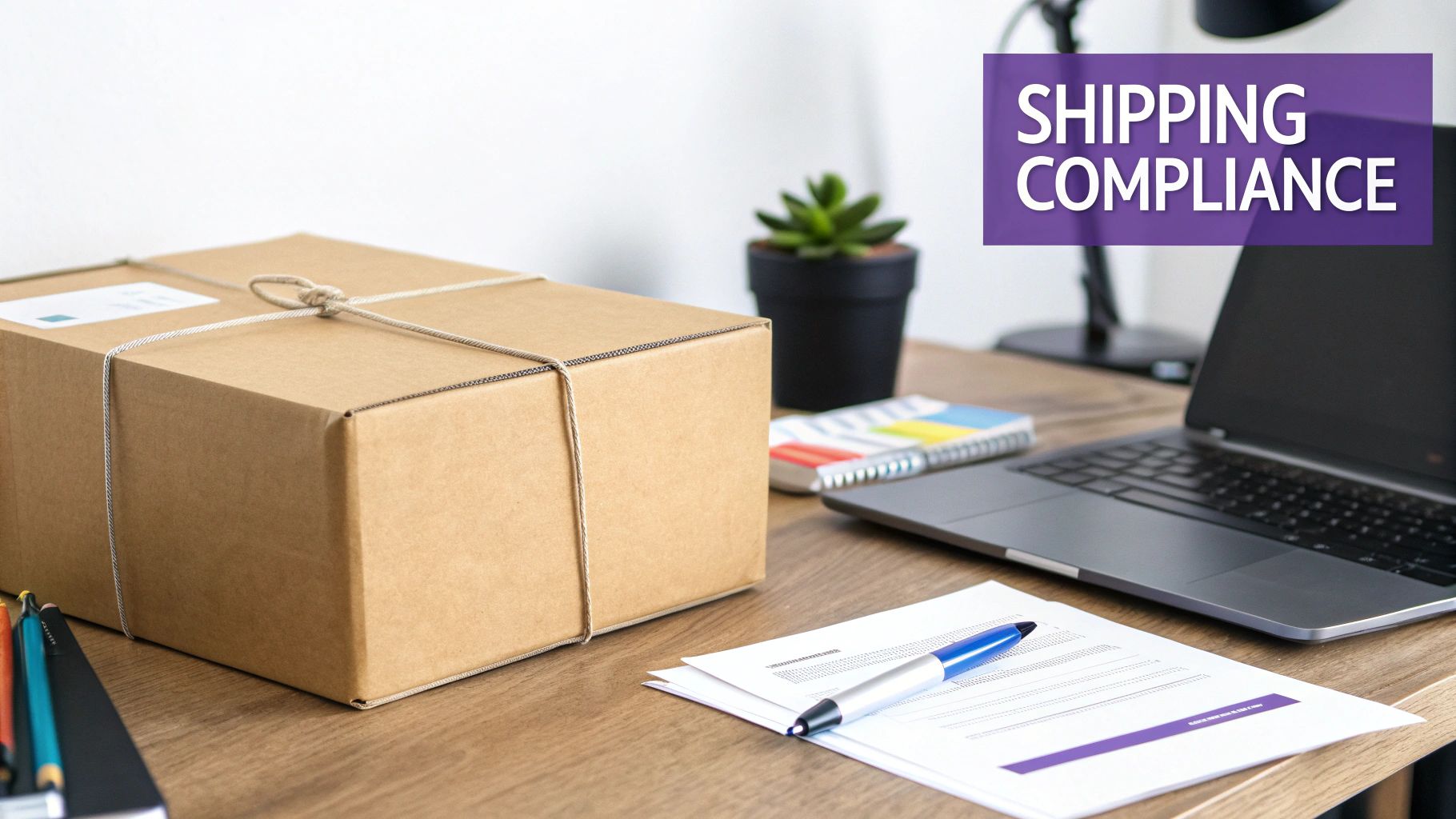
The single most critical piece of paper in your shipping toolkit? The Certificate of Analysis (COA). This isn't just a suggestion; it's the legal passport for every product you send.
The Non-Negotiable Certificate of Analysis
A COA is a detailed report from a third-party, accredited lab that proves what's in your product. When you ship to Illinois, every single package must have a COA that clearly shows one crucial fact: the Delta-9 THC level is 0.3% or less by dry weight. No exceptions.
A solid COA will always include:
- Potency Analysis: This breaks down the concentration of all cannabinoids, especially that all-important Delta-9 THC.
- Purity Testing: This is your proof that the product is clean and free from nasty stuff like pesticides, heavy metals, or leftover solvents.
- Lab Credentials: The report has to come from a reputable, accredited lab to hold any water.
Pro tip: Slap a QR code on your product label that links directly to the COA. This gives law enforcement, carriers, and your customers instant proof of compliance, clearing up any doubt about your product's legality on the spot.
Navigating Carrier-Specific Policies
Just because the 2018 Farm Bill made hemp legal doesn't mean every shipping company has to transport it. Each carrier has its own playbook, and you need to know their rules inside and out to avoid rejected packages or even getting your account suspended.
USPS (United States Postal Service): The Postal Service is usually the go-to for many hemp businesses. To ship with them, you have to self-certify that your products meet all federal, state, and local laws. This means signing a declaration stating your hemp was produced legally and contains no more than 0.3% Delta-9 THC.
UPS & FedEx: Private carriers like UPS and FedEx are also in the game, but they tend to be a bit stricter. They’ll often require you to have a specific hemp shipping agreement on file. You'll typically need to:
- Be ready to provide COAs whenever they ask.
- Use discreet, odor-proof packaging.
- Confirm that both the shipping origin and the destination states allow the product to be sold.
The PACT Act and the Vape Shipping Ban
Here's a major roadblock for a lot of businesses: the PACT Act. This federal law was originally for tobacco, but it got an update that now includes all "electronic nicotine delivery systems" (ENDS). Unfortunately, that definition has been stretched to cover pretty much all vape products.
Because of the 2021 PACT Act updates, it's now incredibly difficult to legally ship any hemp or CBD vape products directly to a customer's doorstep in Illinois—or anywhere else, for that matter. The USPS, UPS, and FedEx are all basically banned from mailing vape devices, even if they only contain legal hemp. This has completely upended the online vape market, pushing consumers back to brick-and-mortar stores. You can read more about how this has impacted the Delta-8 and hemp market in Illinois specifically.
Bottom line: even if your THCA vape cartridge is 100% legal under the Farm Bill, you're almost certainly forbidden from shipping it.
Smart Shipping Strategies for THCA
Given that THCA still operates in a bit of a legal gray area, you need to be extra careful when shipping it to Illinois. These products get more scrutiny, even with federal protection. Here are a few smart moves to make:
- Discreet Packaging: Use plain, unmarked boxes. Don't advertise what's inside. This lowers the chances of theft or someone deciding to take an unnecessary look.
- Odor Control: Hemp flower has a strong smell. Use vacuum-sealed or smell-proof bags so your package isn't flagged as marijuana.
- Documentation Inside: Always stick a physical copy of the COA and a notice to law enforcement inside the box. This notice should clearly explain that the product is legal hemp under the 2018 Farm Bill.
By being meticulous with your documents, knowing the carrier rules, and packaging your products smartly, you can build a shipping process that keeps your business safe and your Illinois customers happy.
The Regulated Market vs. The Unregulated Loophole
In Illinois, two parallel universes for cannabis products exist side-by-side. One is the brightly lit, tightly controlled world of licensed dispensaries. The other is a sprawling, murky landscape of unregulated online sales. This stark contrast is the central conflict shaping the future of CBD, hemp, and THCA shipping in the state.
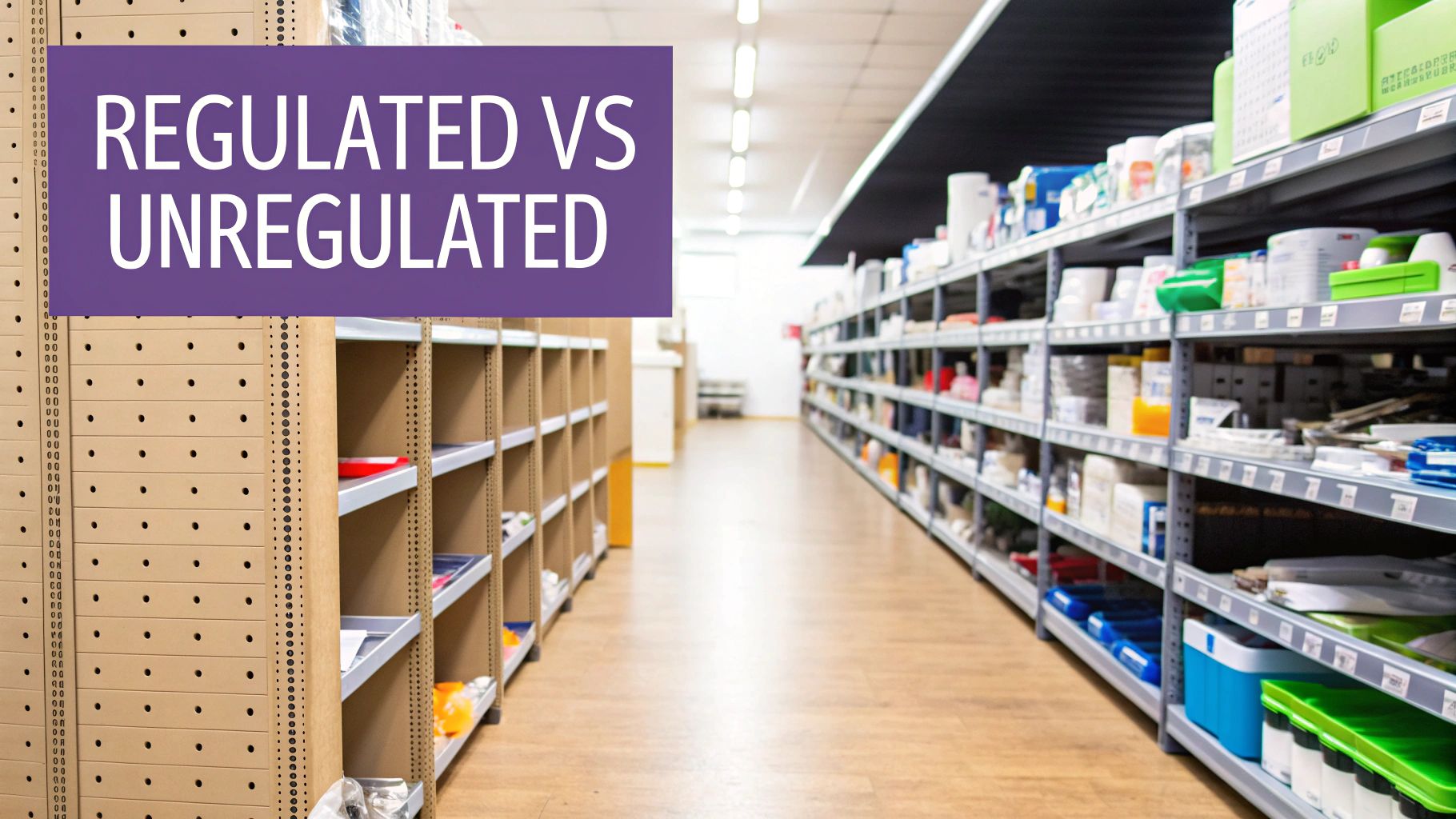
On one side, you have the state’s official, licensed cannabis industry. This is a market born from the Illinois Cannabis Regulation and Tax Act, a framework that dictates every single aspect of how these businesses operate.
Dispensaries in this system are under a microscope. They have to follow strict rules covering everything from product testing and packaging to marketing and age verification. Every product on their shelves has been rigorously tested for potency and contaminants, and every sale is tracked from seed to consumer.
The Unregulated Online Frontier
On the other side of the divide is the booming market for intoxicating hemp-derived products like THCA and Delta-8, which operates in a completely different reality. Thanks to the federal loophole in the 2018 Farm Bill, online sellers can ship products that are functionally identical to what's sold in dispensaries directly to Illinois residents.
These online storefronts often face none of the same hurdles:
- No Mandatory Testing: While reputable brands test their products, there’s no state-enforced requirement for purity or potency.
- No Age Verification: Many sites have flimsy or nonexistent age gates, making it easy for underage individuals to purchase intoxicating products.
- No Marketing Restrictions: They can advertise their products in ways that are strictly forbidden for licensed dispensaries.
This disparity creates enormous economic friction. The state’s licensed cannabis industry is one of the nation's largest, with recreational sales soaring past $2 billion. Yet, it's forced to compete with a parallel, largely unregulated space. This has led to repeated but unsuccessful legislative attempts to regulate intoxicating hemp products like Delta-8 and THCA in the Illinois General Assembly over the past three years. You can find more insights on the Illinois cannabis outlook and its regulatory challenges on beneschlaw.com.
Why This Conflict Matters to Your Business
Understanding this clash is crucial for any e-commerce business shipping to Illinois. The current situation is not stable. Stakeholders from the licensed market are constantly lobbying for a regulatory crackdown, arguing that the unregulated market poses significant public safety risks and unfairly undercuts their highly taxed and regulated businesses.
This ongoing battle between the regulated and unregulated markets is the primary driver of potential legal changes. The "Wild West" era of hemp-derived intoxicants is likely living on borrowed time as state lawmakers feel increasing pressure to act.
So, while shipping THCA to Illinois is possible today, the legal ground is shaky. Businesses operating in this gray area have to stay glued to legislative developments. Any new law could instantly change the compliance landscape, turning a profitable market into a prohibited one overnight. For online sellers, anticipating these shifts and having a plan to adapt isn't just good business—it's essential for survival.
Automating Shipping Rules for E-commerce Success
<iframe width="100%" style="aspect-ratio: 16 / 9;" src="https://www.youtube.com/embed/1P2hDXaaUpk" frameborder="0" allow="autoplay; encrypted-media" allowfullscreen></iframe>Keeping up with the tangled web of CBD, hemp, and THCA shipping laws feels like a full-time job. Manually checking every single order against a constantly shifting list of state, county, and local rules isn't just slow—it's a recipe for expensive compliance mistakes. A single bad shipment can lead to seized products, furious customers, and even legal headaches you really don't want.
This is where good tech becomes your best friend. Instead of wrestling with spreadsheets and checklists, modern e-commerce stores can automate the entire compliance process with shipping restriction tools. These apps act like a digital gatekeeper for your store, making sure you only sell products to people in places where it's actually legal.
How Automated Shipping Restrictions Work
Think of an automated shipping rule engine as a smart bouncer for your checkout page. It takes one look at a customer's shipping address and instantly checks it against the rules you've set up. If a customer from a restricted state or city tries to buy a product they shouldn't, the tool simply blocks the sale before it ever goes through.
These tools are incredibly precise. You can build rules based on:
- Specific Products: Block items like "THCA Flower" or "Delta-8 Gummies."
- Entire Categories: Restrict all products in your "Vapes" collection.
- Geographic Location: Create rules for specific states, counties, cities, or even down to a single ZIP code.
So, when a customer from a state with a total THC ban adds a THCA product to their cart and enters their address, the system catches it. It stops them from completing the purchase right there. This proactive setup saves you from the awkward task of canceling orders after they've been placed and, more importantly, eliminates the risk of shipping illegally.
A Practical Example: Setting Up a THCA Rule
Let's walk through a real-world scenario for a "THCA Flower" product. Given the legal gray area around CBD/Hemp/THCA Shipping Laws in Illinois, you might feel comfortable shipping there but want to block sales to states with clear-cut bans.
Using an app like Ship Restrict on a Shopify store, you could create a rule that says: "Block the product 'THCA Flower' from being shipped to any state except Illinois."
The process is straightforward:
- Select the Product: Choose "THCA Flower" from your product list.
- Define the Restriction: Set up a rule to block this product from shipping to all US states.
- Create an Exception: Add a condition that ignores the rule if the shipping address is in Illinois.
The image below gives you a peek at how a tool like Ship Restrict lets you manage these rules from a simple dashboard.
The screenshot shows a clean, user-friendly interface that lets you create, tweak, and manage complex shipping rules without writing a single line of code.
This one automated rule now handles thousands of potential orders perfectly. It accounts for the current legal situation, cuts down your risk, and can be updated in a few clicks if the law in Illinois or any other state changes. Of course, while automating your shipping is key, mastering e-commerce payment gateway integration is just as vital for smoothly processing the transactions that your rules allow.
Beyond Shopify: What About Other Platforms?
While Shopify has a massive app marketplace, this kind of tech isn't exclusive to one platform. If your business runs on other popular e-commerce systems, similar tools are out there. In fact, you can dive deeper into automated shipping compliance for WooCommerce stores in our detailed guide, which shows you how to apply these same principles on a different platform.
No matter what system your store is built on, you can get the same level of automated compliance. By using these powerful tools, you can turn a complicated legal nightmare into a simple, automated process that just runs in the background, freeing you up to focus on growing your business.
The Future of Hemp Regulation in Illinois
The current landscape for CBD, hemp, and THCA in Illinois feels a bit like the Wild West, but that era is coming to a close. While the 2018 Farm Bill kicked the door open for a national hemp market, it also created a regulatory gray area that state lawmakers are now scrambling to fill. If you're a business or a consumer in this space, looking ahead isn't just a good idea—it's essential for survival.
The biggest push for change is coming from Illinois's licensed cannabis industry. They argue that the unregulated sale of intoxicating hemp products like THCA creates an unfair, and potentially unsafe, market. These products often skip the state’s strict testing, taxing, and age-gating rules, and the licensed market is crying foul. That tension is directly fueling the drive for new legislation.
What Changes Are on the Horizon?
Recent legislative proposals in Springfield give us a pretty clear roadmap of where this is all headed. Several bills have been introduced to close what many call the "intoxicating hemp loophole." While none have passed just yet, they signal a clear and consistent intent from lawmakers.
Here’s what you can expect to see in future regulations:
- Mandatory Age Limits: A strict 21 and over age requirement for purchasing any intoxicating cannabinoid is almost a guarantee, mirroring the existing rules for licensed cannabis.
- Stricter Testing Protocols: Illinois will likely adopt a "total THC" testing standard for all products sold in the state, not just those grown here. This move would effectively ban the sale of high-THCA flower as we know it today.
- Sales and Marketing Restrictions: New laws will almost certainly slap the same marketing and packaging restrictions on hemp-derived intoxicants that already apply to the regulated cannabis market.
The key takeaway here is simple: the legal gray area is shrinking. The only sustainable path forward for businesses in Illinois is to get proactive about compliance and keep a close eye on what’s happening in Springfield.
The Two Sides of the Debate
This regulatory battle really boils down to two opposing viewpoints. On one side, you have consumer safety advocates and the licensed cannabis industry. They're demanding immediate action to protect public health and level the economic playing field, pointing to the real risks of untested products and underage access.
On the other side are hemp industry supporters, who argue that these products are federally legal under the Farm Bill. They're not against rules, but they advocate for sensible regulation—like age gates and clear testing standards—instead of outright bans that they believe would crush a legitimate agricultural industry.
As these two forces continue to clash, the CBD/Hemp/THCA shipping laws in Illinois are guaranteed to change. The era of ambiguity is ending, and a more defined, and almost certainly more restrictive, regulatory future is on its way.
Common Questions About Shipping To Illinois
When you're dealing with the specifics of shipping CBD, hemp, or THCA products into Illinois, a few questions pop up time and time again. Let's clear the air on the most common ones.
Can I Legally Mail CBD Oil to Someone in Illinois?
Yes, you absolutely can. Sending hemp-derived CBD oil to an address in Illinois is perfectly legal. As long as your product comes from legally grown hemp and contains less than 0.3% Delta-9 THC by dry weight, you're in the clear with both federal and state laws.
My best advice? Always ship products that have a Certificate of Analysis (COA) to back up your claims. While carriers like USPS are generally fine with compliant CBD, it never hurts to double-check their specific policies before you drop off a package. It's a simple step that can save you a headache later.
Is It Risky to Ship THCA Flower to Illinois?
This is where things get a bit murky. Shipping THCA flower to Illinois operates in a legal gray area right now. You won't find a state law that explicitly bans the import of federally compliant THCA products—meaning those with under 0.3% Delta-9 THC. This technicality is what allows out-of-state sellers to ship into Illinois, leaning on federal interstate commerce protections.
But here’s the catch: the risk isn't about breaking a law today, it's about what might be law tomorrow. Illinois lawmakers are well aware of this "loophole" and are actively working to close it by adopting a "total THC" standard. Once that happens, high-THCA flower will effectively be banned. So, businesses have to weigh the current opportunity against the very real possibility of a sudden regulatory shift.
Why Can I Buy a CBD Vape Pen in an Illinois Store but Not Get One Shipped?
This one trips a lot of people up, but the answer has nothing to do with Illinois's hemp rules and everything to do with federal law. The culprit is the Preventing Online Sales of E-Cigarettes to Children Act, better known as the PACT Act.
When the PACT Act was updated, its definition of an "electronic nicotine delivery system" was written so broadly that it swept up all vaping devices, no matter what they're used for. That means vapes for CBD, hemp, or THCA are all covered. As a result, major carriers—including the USPS—are flat-out prohibited from mailing these products directly to consumers. It’s why you can walk into a shop and buy one legally, but getting it shipped to your door is a federal no-go.
Trying to keep all these rules straight by hand is a recipe for disaster. Automating your shipping compliance is the only way to operate without constant worry. Ship Restrict gives you the tools to set precise shipping rules by state, county, or even down to the ZIP code, making sure your e-commerce store stays on the right side of the law automatically. Learn more at ShipRestrict.com.

Cody Yurk
Founder and Lead Developer of ShipRestrict, helping e-commerce businesses navigate complex shipping regulations for regulated products. Ecommerce store owner turned developer.